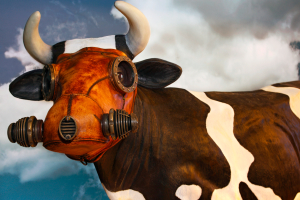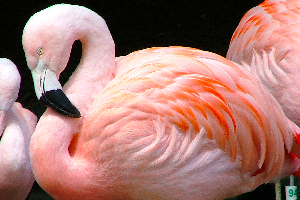Listen to the QUEST radio story When Teaching Climate Gets Controversial.
Californians appear to buck some national trends on climate change issues. A declining number of Americans say there is solid evidence that the world is warming. The number dropped from 71% in April 2008, to 57% in October 2009, according to a study last year by the Pew Research Center. Adults who believe that climate change is a “very serious problem” declined sharply in the same time period.
New Yorker journalist Jane Mayer details in a recent, in-depth article that billionaires David and Charles Koch, titans of the oil industry, have been spending millions of dollars waging a covert disinformation campaign to thwart climate change legislation in the United States.
Aboard the Bio-Bus
A local organization has launched a mobile counter-offensive. The Alliance for Climate Education, a non-profit based in Oakland, has created a hip, multimedia presentation spiced with animation and rock music to reach teens. Think "An Inconvenient Truth" goes MTV. The alliance has shown it to more than 420,000 high-schoolers across the nation in the past year. The presentation teaches teens the basics about climate change and urges them to “do one thing” to fight it.
Alliance staffers also have tricked out an old school bus with clean tech, driving it to schools and museums to showcase renewable technology. The blue bio-bus runs on used cooking oil collected from restaurants. Solar panels on the bus charge cell phones and computers on board.
 A cow wearing a gas mask created controversy at the Monterey Bay Aquarium's climate change exhibit. Photo Credit: Craig Miller
A cow wearing a gas mask created controversy at the Monterey Bay Aquarium's climate change exhibit. Photo Credit: Craig Miller
Unmasking the Cow
Meanwhile, keeping the climate change exhibits up-to-date scientifically is a concern for the museums. At the Monterey Bay Aquarium, outfitting a life-size model cow with a gas mask was prompted in part by a 2006 study by the Food and Agriculture Organization. The FAO study said that industrial production of livestock in general, including cattle, pigs, and poultry, accounts for 18% of all greenhouse gas emissions. But another FAO study released in April -- about the same time the climate change exhibit opened -- examined the GHG emissions for the dairy industry alone, not beef production. It concluded that dairy production contributes just four percent of emissions. The study (PDF download), along with howls of protests from the local dairy industry, helped convince the aquarium to unmask the Holstein.
One last tidbit about interactive exhibits: One of the most popular -- common to the Academy and the Monterey Bay Aquarium -- is surprisingly low-tech. Thousands of visitors write on comment cards about what they can do to fight climate change and hang them on display boards there. One of them, in a child’s handwriting, read “Reduce, reuse, recycle and homework is bad for the environment."
36.617894 -121.901994
 Elegant Chilean flamingos help visitors gain a new perspective on our changing environment in the Monterey Bay Aquarium's newest special exhibit: "Hot Pink Flamingos: Stories of Hope in a Changing Sea." ©David Barnhardt/Akron Zoo.
Elegant Chilean flamingos help visitors gain a new perspective on our changing environment in the Monterey Bay Aquarium's newest special exhibit: "Hot Pink Flamingos: Stories of Hope in a Changing Sea." ©David Barnhardt/Akron Zoo. 
